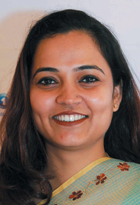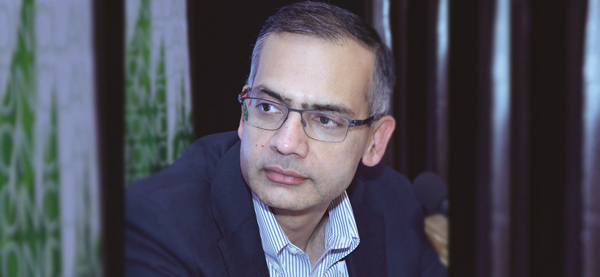Neelu Singh, Director & CEO, Ezeego1.com was of the opinion that India was consolidating its position as the global hub for IT and BPM services – enabling digital transformation. “E-commerce is driving rapid growth of domestic IT-BPM services attracting unprecedented levels of global interest and funding,” she said.
 Noting that the government’s focus on programs like ‘Digital India’ and ‘Make in India’ were going to enable a rapid growth of the sector, she added that the current trend in Indian IT outsourcing was to adapt new age computing technologies like cloud computing and SOA etc.“A growing number of Indian IT companies are adopting services in the Cloud as a part of their wider product range. NASSCOM, research ‘Deconstructing the “CLOUD” says that the cloud computing market in India could reach US $16 billion by 2020. Among the three major cloud-computing models, major Indian IT players are adopting software as a service (SaaS), and platform as a service (PaaS), when compared to infrastructure as a service (IaaS),” she detailed. She further noted that cloud computing was also poised to bring new capabilities and business opportunities for Indian IT companies in the domestic as well as international markets. “Virtualization solutions are being adapted by Indian IT organizations, thereby saving space and leading to server consolidation,” Neelu Singh added.
Noting that the government’s focus on programs like ‘Digital India’ and ‘Make in India’ were going to enable a rapid growth of the sector, she added that the current trend in Indian IT outsourcing was to adapt new age computing technologies like cloud computing and SOA etc.“A growing number of Indian IT companies are adopting services in the Cloud as a part of their wider product range. NASSCOM, research ‘Deconstructing the “CLOUD” says that the cloud computing market in India could reach US $16 billion by 2020. Among the three major cloud-computing models, major Indian IT players are adopting software as a service (SaaS), and platform as a service (PaaS), when compared to infrastructure as a service (IaaS),” she detailed. She further noted that cloud computing was also poised to bring new capabilities and business opportunities for Indian IT companies in the domestic as well as international markets. “Virtualization solutions are being adapted by Indian IT organizations, thereby saving space and leading to server consolidation,” Neelu Singh added.
Sharing her understanding of trends across Asia Pacific, she shared that there was a similarity in development. To her understanding, another important trend was the increasing focus by different countries on innovation – areas of mobile applications, online marketing, digital transformation, social media and digital convergence. “In some areas, Asia Pacific countries are trend setters. While the global trend is more or less the same, it is the scale that differentiates APAC countries from other western countries. In fact, most of the Western countries outsource their IT solutions to a few APAC countries for the sheer quality, knowledge and the scale of operations which these APAC countries specialize in and India is one such country,” she stressed.
Crediting the Indian government and NASSCOM for playing a key role in retaining India’s brand on the global Information technology map, she said that the central and state governments were contributing in offering a sound infrastructure and nurturing technically apt resources. “Indian IT service providers continue to move up the value-chain to offer higher end research and analytics services to their clients. As the quality and quantity of work keep increasing, India’s brand equity in the IT space will keep enhancing,” she said.
Moving forward, she believed that technology solutions that were available for travel domain in the market only catered to the specific business functions and there wasn’t any readily available enterprise solution that catered to the all the business verticals of a travel company – which was a major challenge.
She further said that standardization was one of the key challenges for the travel and tourism industry. According to her, apart from airlines, there was no standardization available as of now; while there were efforts made in that direction, India was far away from it. “Also, a lot of it is dependent on statutory requirement and compliance which makes complete automation without human intervention difficult to achieve,” she added.
Neelu Singh noted that what compounded the complexity further, technology companies found it difficult to integrate their ecosystem with external suppliers due to lack of technical standards that were not regulated.
There was also a profound change in the consumer behavior which was driven by constant infusion of technology, helping them take smarter decisions. “Therefore, it is imperative for companies to quickly adopt automation and product refinement through personalization and keep innovating in a continuous improvement mode,” she shared the way forward for companies.
Highlighting the need for infusion of elements like data convergence, reputation management, mobile commerce, digital transformation and automation, she believed that challenges were aplenty. “It must be ensured that the time needed to service a client is quick, flawless and supported by multiple channels. Clients, today, have multiple options and a slight delay will make one lose the client forever. Other key challenges are keeping the cost of operations low, achieving high conversion ratio and still improve the quality of service,” she said. “How best companies adopt these and ensure that the clients are serviced with minimum turnaround time will determine the survival of the fittest,” Neelu Singh added.
Giving a peek into her company’s strategy, she said “We see opportunities in global distribution of our platform and content and that is the focus and thrust of Ezeego1 for the next 2 years.” Driven by this, Ezeego1.com also plans to foray into new markets to expand their reach. “Mobile applications for client engagement apart from bookings, digital marketing solutions and data convergence are the key areas where we are focusing on,” she further detailed. She concluded by stating that customer retention and faster response times were areas of thrust for them, and they aimed to achieve it through automation.




































